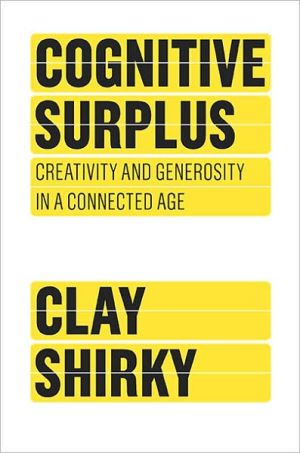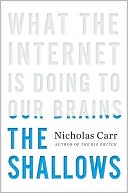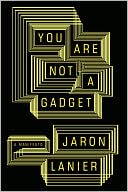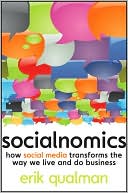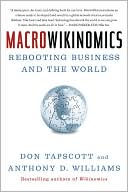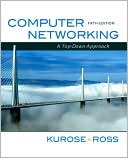Cognitive Surplus: Creativity and Generosity in a Connected Age
The author of the breakout hit Here Comes Everybody reveals how new technology is changing us from consumers to collaborators, unleashing a torrent of creative production that will transform our world.\ For decades, technology encouraged people to squander their time and intellect as passive consumers. Today, tech has finally caught up with human potential. In Cognitive Surplus, Internet guru Clay Shirky forecasts the thrilling changes we will all enjoy as new digital technology puts our...
Search in google:
The author of the breakout hit Here Comes Everybody reveals how new technology is changing us from consumers to collaborators, unleashing a torrent of creative production that will transform our world. For decades, technology encouraged people to squander their time and intellect as passive consumers. Today, tech has finally caught up with human potential. In Cognitive Surplus, Internet guru Clay Shirky forecasts the thrilling changes we will all enjoy as new digital technology puts our untapped resources of talent and goodwill to use at last. Since we Americans were suburbanized and educated by the postwar boom, we've had a surfeit of intellect, energy, and time-what Shirky calls a cognitive surplus. But this abundance had little impact on the common good because television consumed the lion's share of it-and we consume TV passively, in isolation from one another. Now, for the first time, people are embracing new media that allow us to pool our efforts at vanishingly low cost. The results of this aggregated effort range from mind expanding-reference tools like Wikipedia-to lifesaving-such as Ushahidi.com, which has allowed Kenyans to sidestep government censorship and report on acts of violence in real time. Shirky argues persuasively that this cognitive surplus-rather than being some strange new departure from normal behavior-actually returns our society to forms of collaboration that were natural to us up through the early twentieth century. He also charts the vast effects that our cognitive surplus-aided by new technologies-will have on twenty-first-century society, and how we can best exploit those effects. Shirky envisions an era of lower creative quality on average but greater innovation, an increase in transparency in all areas of society, and a dramatic rise in productivity that will transform our civilization. The potential impact of cognitive surplus is enormous. As Shirky points out, Wikipedia was built out of roughly 1 percent of the man-hours that Americans spend watching TV every year. Wikipedia and other current products of cognitive surplus are only the iceberg's tip. Shirky shows how society and our daily lives will be improved dramatically as we learn to exploit our goodwill and free time like never before. The Barnes & Noble Review It's easy to find quibbles with an argument as audacious and thought-provoking as that put forward in Cognitive Surplus. The fact is, Shirky has written an important book about an interesting moment in human history. We have arranged our modern lives to maximize free time. Now, thanks to the virtual infrastructure of the internet, we are able to collaborate and interact as never before. The question is what these collaborations will create. A surplus, after all, is easy to squander.
1 Gin, Television, and Cognitive Surplus 12 Means 313 Motive 654 Opportunity 975 Culture 1316 Personal, Communal, Public, Civic 1617 Looking for the Mouse 183Acknowledgments 215Notes 217Index 231
\ Kirkus ReviewsDigital-age guru Shirky (Interactive Telecommunications/New York Univ.; Here Comes Everybody: The Power of Organizing Without Organizations, 2008, etc.) argues that new technology is making it possible for people to collaborate in ways that have the potential to change society. By "cognitive surplus," the author refers to the free time of the world's educated citizenry, which amounts to more than one trillion hours per year. In recent decades, the author writes, most people have devoted much of that time-20 hours per week-to watching television. But that is changing. Young people are now spending less time as passive TV viewers, or consumers, and more time using fast, interactive media as producers and sharers in pursuit of their favorite activities. Their behavior demonstrates that in a wired society it is possible to turn free time into a shared global resource that can be harnessed to connect individuals to achieve beneficial outcomes. Examples include such innovations as Wikipedia, the online free-content encyclopedia; PickupPal.com, a global rideshare community; and Ushahidi.com, which was created to gather citizen-generated reports on acts of violence in Kenya. In this well-written and highly speculative book, Shirky suggests that in these ways new media has enormous potential to transform our lives. No longer an abstraction called "cyberspace," social-media tools are now part of daily life, he writes. As society's connective tissue, they are flexible, cheap and inclusive, and allow people to behave in increasingly generous and social ways. The author discusses the many factors that have given rise to social media and suggests the conditions that will best allow voluntary groups to take advantage of the world's aggregate free time to benefit society. "If we want to create new forms of civic value," he writes, "we need to improve the ability of small groups to try radical things." Shirky may be overly optimistic about the possible benefits of social media, but he makes clear their growing global importance. An informed look at the social impact of the Internet. Agent: John Brockman/Brockman, Inc.\ \ \ \ \ From the Publisher"An informed look at the social impact of the Internet." —-Kirkus\ \ \ Library JournalShirky (interactive telecommunications, NYU; Here Comes Everybody) opens his latest nonfiction work in bleak, dangerous, overcrowded 1720s London, then moves to the present digital age, showing how advancements in technology and connectivity have spurred a torrent of collaborative creativity—from carpools and campuswide study groups to Wikipedia and Linux—whose potential we've yet fully to exploit. Veteran voice artist Kevin Foley reads with authority, adding credence to Shirky's text. Not just for IT professionals, this title should appeal also to business and community leaders, who will glean much insight into the profound impact and potential of developments in the technological age. [The Penguin Pr. hc was described as a "thought-provoking, sunny, optimistic read," LJ 6/15/10.—Ed.]—M. Gail Preslar, Eastman Chemical Co. Business Lib., Kingsport, TN\ \ \ \ \ The Barnes & Noble ReviewCognitive Surplus, the new book by internet guru Clay Shirky, begins with a brilliant analogy. He starts with a description of London in the 1720s, when the city was in the midst of a gin binge. A flood of new arrivals from the countryside meant the metropolis was crowded, filthy, and violent. As a result, people sought out the anesthesia of alcohol as they tried to collectively forget the early days of the Industrial Revolution.\ For Shirky, the gin craze of 18th-century London is an example of what happens when societies undergo abrupt changes, such as the shift from rural agriculture to urban factories. Life becomes a bewildering struggle, and so we self-medicate the struggle away. But Shirky isn't a historian, and this isn't a history book. Instead, he's trying to grapple with our future. As he notes, the second half of the 20th century has been defined by a similarly difficult social transition, as we move into a post-industrialized world characterized by the incessant flow of information.\ So what has been our gin? Shirky's answer is simple, perhaps too simple. He argues that the television sitcom -- those comic soap operas that saturated the airwaves for decades -- was the alcohol of post-war societies, "absorbing the lion's share of the free time available to the developed world." (The numbers are depressing: even today, Americans sit through a hundred million hours of TV commercials every weekend.) Instead of fretting about the dislocations of the Information Age, we sat on the couch and watched Gilligan's Island.\ But now, Shirky says, the reign of television is coming to an end. For the first time in decades, a few select cohorts of those under the age of 30 seem to be watching less TV than their parents. (Shirky doesn't mention that overall television consumption is still rising. According to Nielsen's media tracking survey, the amount of time the average American spent in front of the tube reached 153 hours per month in 2009, the highest level ever recorded.) But if young people aren't watching quite as many mindless sitcoms, and they're not drunk in the streets, then what the hell are they doing?\ They're online, prowling the world wide web. Shirky describes this shift in media consumption as a net "cognitive surplus," since our brain is no longer mesmerized by the boob tube. Needless to say, he describes this surplus as a wonderful opportunity, a chance to get back some of the productive social interactions that were lost when we all decided to watch TV alone. And when this new pool of free time is combined with the internet -- a tool that enables strangers all across the world to connect with each other -- the end result is a potentially vast new source of productivity. "The wiring of humanity lets us treat free time as a shared global resource," Shirky writes. Furthermore, the web allows people to "design new kinds of participation and sharing that take advantage of that resource."\ After Shirky introduces his argument, much of the remaining 170 pages of the book are devoted to outlining what this surplus has produced. The author begins by describing the protests in South Korea over the importation of American beef. Interestingly, a majority of the protesters were teenage girls, who had been motivated to take to the streets by their online conversations. (Many of these conversations took place on a website dedicated to a Korean boy band.) Shirky describes this protest movement in breathless terms: "When teenage girls take to the streets to unnerve national governments, without needing professional organizations or organizers to get the ball rolling, we are in new territory," he writes.\ But are we really? There were, after all, a few political protests before the internet. Somehow, the students at Kent State found a way to organize without relying on the chat rooms of Bobdylan.com. While the internet might enable a bit more youthful agitprop, it seems unlikely that we are on the cusp of a new kind of politics, driven by the leisure hours of the young.\ The most compelling example of Shirky's cognitive surplus is also the most obvious: Wikipedia. He estimates that the pages of Wikipedia represent more than 100 million hours of human thought. All that unpaid labor has produced, by far, the most comprehensive, thorough, and intelligent summary of human knowledge that has ever existed. (Wikipedia includes more than 15 million free articles in 200 different languages.) And it was all done by perfect strangers, most of whom are not experts in anything.\ But Wikipedia is not new; the online encyclopedia was first launched in 2001. After getting enthralled by the opening premise of the book, I expected Shirky to have a long list of exciting new examples of our surplus at work. This is where the book gets slightly disappointing. From Wikipedia, Shirky takes us on a tour of ... lolcats. He cites ICanHasCheezburger.com as an example of what happens when our cognitive surplus is transformed into "the stupidest possible creative act." While Shirky pokes fun at the site, he still argues that it represents a dramatic improvement over the passive entertainment of television. "The real gap is between doing nothing and doing something, and someone making lolcats has bridged that gap."\ There are two things to say about this. The first is that the consumption of culture is not always worthless. Is it really better to produce yet another lolcat than watch The Wire? And what about the consumption of literature? By Shirky's standard, reading a complex novel is no different than imbibing High School Musical, and both are less worthwhile than creating something stupid online. While Shirky repeatedly downplays the importance of quality in creative production -- he argues that mediocrity is a necessary side effect of increases in supply -- I'd rather consume greatness than create yet another unfunny caption for a cat picture.\ The second thing is that it remains entirely unclear if the creative and generous acts made possible by the internet are really a replacement for time spent watching sitcoms. After all, people have always had hobbies; although they watched plenty of bad television, they also read newspapers and built model airplanes, went on hikes and volunteered at the local shelter. In other words, we weren't quite as mindless or disconnected as Shirky seems to believe. In his zeal to celebrate the revolutionary capabilities of the internet, Shirky downplays the virtues of the world before the web. And then there is the terrifying possibility (not addressed by Shirky) that our online life is detracting, not from time spent watching TV, but from our interest in things that have nothing to do with technology, such as talking with friends or taking walks in the park.\ It's easy to find quibbles with an argument as audacious and thought-provoking as that put forward in Cognitive Surplus. The fact is, Shirky has written an important book about an interesting moment in human history. We have arranged our modern lives to maximize free time. Now, thanks to the virtual infrastructure of the internet, we are able to collaborate and interact as never before. The question is what these collaborations will create. A surplus, after all, is easy to squander.\ --Jonah Lehrer\ \ \
